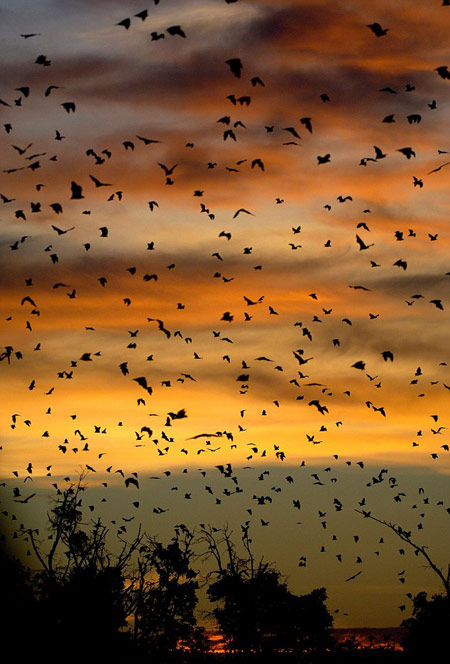据英国《每日邮报》报道,一个由多国科学家组成的研究团队宣称找到此次埃博拉病毒大爆发的源头:一名2岁男孩被感染该病毒的果蝠叮咬。
研究人员认为,一名2岁小男孩被感染了埃博拉病毒的果蝠叮咬,随后他又将病毒传给母亲,母子二人都在一周内死亡。此后,埃博拉病毒随着前来参加葬礼的人越传越远,疫情范围越来越大。很早以前,科学家们就已经发现,蝙蝠是埃博拉病毒的主要携带源,但很少传染给人。
此前,埃博拉病毒爆发多是因为猎人捡到感染病毒动物的肉,并将其卖掉引发的。而在西非乡村地区,果蝠是一种常见食物,经常被熏烤或做汤吃掉。
但科学家们称,他们还没有百分之百的证据,只能说果蝠是导致此次埃博拉病毒大爆发的可能原因。如果蝙蝠理论获得证实,当地人可能会试图消灭这种动物,这将造成“生态灾难”,因为蝙蝠能给作物授粉和消灭害虫。

The largest outbreak of the deadly disease Ebola was caused by an infected bat biting a toddler, say a group of international researchers.
The 17-strong team of European and African tropical disease researchers, ecologists and anthropologists have spent three weeks investigating the outbreak of the disease in Guinea, Liberia, Ivory Coast and Nigeria.
The researchers captured the bats and other creatures near the village of Meliandoua in remote eastern Guinea, where the present epidemic began in December 2013.
The boy was bitten and passed the infection on to his mother and both were dead within a week. The disease was then spread far and wide by mourners who came to the funeral.
Scientists have long believed that bats are the main carriers for the disease but it is rare for them to pass it on to man.
Most of the previous outbreaks have been caused by meat from dead infected animals collected by hunters who then sell it on.
Fruit bats, however, are widely eaten in rural west Africa – either smoked, grilled or in a spicy soup.
The team lead by epidemiologist Fabian Leendertz, a disease ecologist at the Robert Koch Institute in Berlin, are expected to publish their results in a major journal soon.
Initial research believed that a new strain of Ebola had emerged in west Africa but according to Herr Leendertz the strain of the disease is one related to as Zaire ebolavirus, identified more than 10 years ago in the Congo.
Herr Leendertz’s team believe that an infected straw-coloured fruit bat brought the disease to Guinea. The mammals are known to travel long distances and usually settle in forests near cities.
More than 1,300 people have died in the current epidemic many in Liberia.
Herr Leendertz said: "We spent eight days in Meliandoua. They told us they regularly catch bats, like every other village in Guinea, Sierra Leone and Liberia. The evidence is not 100 percent and we can only say that it is possible.
‘They can travel far in one night. I don't think an individual bat or colony migrated all the way from Congo or Gabon to west Africa. These big colonies are connected. There is a possibility for the virus to mix between colonies. [The bats] share the same fruit. It is likely not to have even been one species of bat. The virus may jump from one species to another."
If the bat theory confirmed, locals would try to destroy the colonies which says Herr Leendertz ‘would be an ecological disaster because bats pollinate plants and devour insects. And bat hunts would also only increase human contact with potentially infected animals."
(来源:Daily Mail 编辑:丹妮)
